- Home
- Robin Hobb
Forest Mage Page 21
Forest Mage Read online
Page 21
Page 75
His face twitched. For a moment, he struggled for control and then he released his temper. “There’s your dinner, Nevare! Enjoy it! It’s the last morsel of food you’ll see for a time. ” He drew in a sharp breath through his nose. “I thought I could trust you to adhere to our agreement! Will I never learn? You haven’t a scrap of honor left, have you? You’ll lie, you’ll cheat, and you’ll steal in whatever way you must in some idiotic effort to prove your ridiculous claims! And why? Because you are so desperate to make your failure my fault! Because you can’t accept responsibility for your own mistakes. You always have wanted someone else to be in charge of you and I fear you always will! You will never lead, Nevare, because you cannot command yourself!
“But I will show you what it is a true officer does, and that is, he does what must be done to keep his troops prepared. There will be no more trust between us. You will stay here in this room, and I will supervise your fast. You will see that no magic is at work here, only your own sloth and greed. ”
He’d run out of breath. I remained standing and staring at him. May the good god help me as I recall that it was all I could do not to fling myself on my knees and snatch at the spilled food that was seeping across the floor. As if he knew the true focus of my attention, he pointed at it and snarled, “And clean that up!”
He turned on his heel and left me, shutting the door sharply. I heard him snap the lock into place. And the moment I knew it was latched and he could not surprise me, I dropped down to right the remainder of the glass that still cradled a mouthful of wine. The plate had not broken and part of my meal had sheltered beneath it. I cut my finger on the broken wine glass as I snatched up the spoon and carefully scooped as much of the meat pie as I could back onto the plate. Luckily, the flaky crust had kept most of its shape. I was able to gently slip my hand under it and lever it back onto the plate. The crusty seed roll was not damaged at all. The dish that had held my small serving of fruit compote had broken. I studied it, weighing the dangers of eating broken glass against the fragrance and flavor of the lush pieces of plump fruit gleaming with spiced syrup. Trembling with self-restraint, for the tantalizing aromas of the spilled food were all around me now, I forced myself to very carefully inspect each piece of fruit before I salvaged it. I placed my rescued meal back onto the tray and took it to my desk. The sight of the spilled and ruined food on the floor was almost more than I could stand. I draped the soiled napkin over it, and then hurried to my broken meal. When, an hour later, I had finished the last tiny morsel of bread, I sighed and set myself to the task of cleaning up the spilled mess.
It was only as I knelt like a penitent before the glass-strewn remnants of what should have been my meal that I forced myself to admit that my increased weight was not the only way the magic had changed me. Once I would have been too proud to salvage a meal that had fallen on the floor. Now the importance of food went far beyond its ability to nourish me. Even the pleasure I felt in the sensation of eating was secondary to another, deeper change in me.
I built my new body to house my magic.
The moment I framed the thought, I felt the rightness of it. Yes, I was fat. But I was strong now, stronger than I had ever been. And over the days of forced privation and heavy labor, I had noticed changes in myself. My body produced very little waste now. The despised chamber pot had gone largely unused. I noticed a stillness to my body that seemed new to me, in that when I sat still and studied, I felt my body sink into a greater state of rest. It reminded me of being suspended in water, or of awareness hovering in that nether place between sleep and wakefulness. I suspected that my internal workings had become terribly, terribly efficient, and that whenever I was not using my arm or my leg, it went into a suspension beyond simple rest.
I used what was left of the wash water in my basin to wet the napkin and clean my floor. I put the wet napkin and dishes and broken crockery on the tray and set it aside.
It took every bit of self-discipline I had to follow my routine that evening. I studied the lessons I’d set for myself, and faithfully entered the whole incident into my journal. I did not write there the questions that swarmed through my brain. How far would my father go in his quest to prove himself right? Would he let me die of starvation? I did not think so, but I was no longer certain.
CHAPTER NINE
PLAGUE
I came to awareness the next morning when the early summer sunlight reached through the window and touched my skin. It was simple comfort, one blessing that never changed. I closed my eyes and steeped my soul in it.
I arose at my usual time. As always, I washed and dressed and made up my bed. Then I sat down on the edge of it to await what the day might bring.
Page 76
Is there anything so tedious as waiting? I tried to occupy my mind, first with my history book, and then by placing my chair near the window and watching the activities in the courtyard below.
At first, there was little to distract me. I saw a man ride in, a messenger from the town council in Burvelle’s Landing by the armband he wore. He hurried up the steps, but his horse was not led away.
A short time later, my father and brother emerged with the messenger. My father was still putting on his coat. Two more horses were brought and they all rode away at a gallop. That effectively dashed my hopes of seeing my father that morning. I sat for a time longer, wondering if my keeper would come for me, even though the hour for that was some time past. But no one came.
After a time, suspense gave way to boredom. Hunger, my ever-present companion, tormented me. The intensity of the pangs always seemed greatest when I had nothing else to occupy my mind. I lay on my bed and tried to read the next chapter in Bellock’s Warfare. The Varnian tangled in my mind, Bellock’s prose seeming stilted and pompous, and after a time I lowered my book to my chest and closed my eyes.
I tried to think my situation through. Was there an alternative to this futile pissing match? I was virtually my father’s prisoner. I could break down the door now, while he was gone, and then I could run away. Not only did the cowardice of that act repell me, but also the thought that it would confirm my father’s poor opinion of me and dash even my tiny hope of returning to the academy and the future that I had always expected.
I took a deep breath, and as I sighed it out, I felt a sharp resolution form in me. Keen and hard as a sword’s edge it was. I would persevere. I would not be the one to blink first. I slowly sighed out the air in my lungs, relaxing as I did so, and sank into a stillness deeper than sleep. I would escape hunger there. For a time, I hovered in a place that was quiet, dark, and empty.
For a time, I waited, feeling a slow peace seep into me. I felt that other me, quiescent for weeks, stir in me again. He was unalarmed by all that had befallen me. He accepted the changes, the thickening flesh that enfolded me, not placidly but with a lucid joy. As I took in another slow breath, I felt him unfold himself like a shadow filling my body. He stretched out into my arms and settled into my legs. He mourned my empty belly but joined me in my resolve. We would wait.
I felt a shiver of unease at his contentment, and then I accepted him as a passive part of myself. What harm could he do me? I sighed and again sank into his stillness. I dreamed of a forest, peaceful under the summer sunlight.
When next I became aware of myself, the sun had moved past my window. It was not dark by any means, but the golden square of sunlight that had soaked me had moved. I opened my eyes, blinking slowly. No one had come to my room. My nose told me there was no food to be had, only water. I rose and drank all that was left in my pitcher. Then, moved by an impulse I did not understand, I pushed my bed across the room into the slowly moving rectangle of sunlight from my window. I took off my shirt and lay down again, basking in the warm light on my skin. I breathed out again and once more sank my consciousness to the dim and comfortable place where my other self reigned. He took me in and sheltered me with dreams
of deep-reaching roots questing for water. I dreamed of flowers turning toward the sun and of leaves absorbing light, their stoma shut tight to conserve moisture. The forest waited for me. It called me to become one with it. My breathing became an occasional wind that barely stirred the reaching leaves. My heartbeat was a distant, random drumbeat.
I awoke to darkness and the rattling of the hasp that secured my door. I sat up immediately, swinging my feet to the floor, and then felt a sudden wave of vertigo. Before it could pass, a kitchen servant entered bearing a tray. He lifted the branch of candles he bore, scowling round my dark room. He set down his candles and his tray on my desk. “Your dinner, sir. ” The simple words could barely contain the contempt he filled them with.
“Thank you. Where is my father?”
He stooped, full of disapproval, to lift the tray of soiled and broken dishes that I had left by the door on the floor. He was a tall fellow, pale as a mushroom, an unmuscled house servant. He sniffed loudly as if the smell of the stale food scraps disgusted him.
“Lord Burvelle has a guest this evening. He directed me to deliver this tray to you. ” He turned away, dismissing me as beneath his notice.
I stepped between him and the door. He recoiled from me as if I were a threatening bear. At least my bulk was good for something, if only intimidating servants. “Who is my father’s guest?” I asked him.
“Well, I scarcely think—”
Page 77
“Who is my father’s guest?” I repeated, taking a step closer to him. He backed away, now holding the tray of broken dishes as if it were a shield.
“Dr. Reynolds from the Landing has come to call today,” he said hastily.
The mention of the doctor and my recall of the messenger I had glimpsed early in the day mingled and awoke an urgent fear in me. “Is there sickness in the Landing? Is that why the doctor is here?”
“Why, I’m sure I don’t know! It’s hardly my business to question why Lord Burvelle has a guest at his table. ”
“What did they talk about?”
“I do not eavesdrop on my betters!” He seemed incensed that I had even suggested such a thing and poked the tray toward me as it he were trying to intimidate a dog. “Out of my way. I have my work to do. ”
I stared at him, slowly realizing that he spoke to me as if I were nobody, an underling, a beggar. Not as if I were a son of the household. Would a time come when everyone treated me with such disregard?
“Say, ‘please, sir,’” I instructed him softly.
He glared at me and then I think that something in my face persuaded him that was an error. He licked his narrow lips nervously and then fled back to formality. He spoke stiffly. “If you would please to step out of my way, sir, I’ll be about my proper work. ”
I nodded to him. “You may go. ” I stepped aside. He hurried to the door and scuttled through it like a fleeing rat. An instant later, he slammed it behind him and I heard him clack the lock shut on the hasp.
“Tell my father I need to speak with him tonight!” I shouted through the door.
The only response I received was the sound of his footsteps retreating. I ground my teeth, almost certain that my message would not be delivered. Was I imagining a danger? It could all be coincidence, my guard mentioning sickness in Franner’s Bend, the messenger this morning, the visit from the Landing’s only doctor. I tried to dismiss my worry, but could not.
But before my frustration could become anger, I was distracted from it. My nose had picked up a scent, and like a dog on a trail, I followed it to the tray on my desk. I lifted the napkin that covered my plate.
Bread. A single rounded loaf, a cross scored in the top of it, the size of my two fists put together. And next to it, a carafe of water. For a moment, I felt dismayed, but then my senses seized on what was there rather than on what I lacked. The loaf was a golden-topped mound. When I lifted it, I felt the slight grease on the bottom of it where it had kissed the hot pan. I broke it in my hands and tore it apart. The top was crusty, the inside slightly stretchy and tender. I smelled the summer wheat.
I filled my mouth with a bite. The flavor overwhelmed any other thought I might have framed. I tasted every element of the bread, the grain that had grown tall in our Widevale sunshine, the hint of salt, the yeast that had leavened it, the richness of the butter that had gentled the crust. I savored it all and it filled my senses. I ate without haste, taking bite after bite, only pausing to drink the cool, clear water. I felt the food enter my body—I swear I could feel it becoming part of me.
Plain bread and cold water. My father had threatened me with this as a hardship, but while I consumed my loaf and the flagon of water that accompanied it, I felt I truly had all that any man could need. When I drank the last of my water and set my mug down, I felt a wave of contentment come over me.
I tidied away my tray and set out my journal and my schoolbooks, resolved to follow my now too-familiar routine. My father, I decided, would or would not come to me, as he was inclined. There was nothing I could do about it.
It was harder than usual to keep my mind on my work. Doggedly, I forced myself to complete the lessons I’d set. Despite my day’s rest, sleepiness kept creeping up on me. Only the strictest self-discipline kept me to my routine. I followed my book work with an honest entry in my journal, confiding to that page my fear that disease might be threatening Widevale. When I closed my journal, I gave in to sleepiness and immediately went to my bed. I knelt and more by rote than by faith said my evening prayers. I prayed for Burvelle’s Landing rather than myself, no longer certain that I believed in the strength and power of the good god so much as hoped that he existed and would hear my pleas for mercy. As I pulled up my blanket and closed my eyes, I wondered what I truly believed now. I thought of the Poronte family and their ghastly chandelier of dead and dying birds. Could their older gods have protected me from this fate? At what price would such protection come? Despite these thoughts, sleep reached up and pulled me swiftly under its waves. I did not dream.
Page 78
When light first crept in my window, I came to awareness of it. I did not bother to dress. If anyone came to my door, that would be soon enough to rise. Instead, I got up only long enough to push my bed across the room to where the first rays of light illuminated it. Then I lay down again and once more plunged into something that was not sleep. I could feel how my body now conserved all things—water, food, and even the energy I used to breathe or move. I was like a mighty tree, standing silent and bare of leaf, life seemingly suspended until spring might come again.
That day, I arose only at intervals to move my bed to keep it always centred under the light. When the light finally faded from the sky and darkness poured into my room, the same servant once more tapped at my door, opened it, and brought me my loaf and water. “What tidings from the Landing?” I demanded of him as I sat up on my bed.
“Sickness,” he said brusquely. Before I could rise, he was out the door, shutting it firmly behind him. For a moment, dread paralyzed me. Were my worst fears coming to pass? Or, as my father had said, was it merely some lesser illness that would pass like a summer squall? I rose, I ate, and I returned to my bed. I slept again.
The next day was identical, save for one thing. The evening passed with no servant and no food. The hour for it passed, and then another. At last, I swallowed my dignity and pounded on my door and shouted. After some time had passed, I heard a maidservant’s voice outside my door. “Sir, please! People are trying to take their rest. ”
“I’ve had no food or water today! Bring me something, and I’ll be quiet. ”
Silence. Then, “I’ll try to find someone who has the key, sir. Your father was away all the day and gave no orders about you. And your mother is ill, so I cannot ask her. I’ll go tap on your father’s study door, to see what he says. Be patient, please, and quiet. I’ll see what I can do. ”
“T
hank you. My mother is ill?”
There was no reply. I shouted “Miss!” but got no response. I sat down and waited as the night deepened. She did not return. I tried to imagine what might be happening in the rest of the house. If my mother were ill and resting in the other wing, the majority of the servants would be tending to her and her needs. I wondered where Rosse was, and Elisi and Yaril. Were they also ill? Worry for my mother replaced my concern about food and water. My hunger became a still emptiness inside me. With no other recourse, I returned to my bed and slept again. That deeper stillness reached up and claimed me.
Another day passed slowly. No one came to my door. I moved my bed to keep the sunlight on it. Several times, I pounded on the door and shouted, but no one came. I felt a curious lack of energy. It was hard to rouse myself, and harder still to force myself to take action. Rest seemed my wisest course.
On my fourth day without sustenance of any kind, I roused myself. A dull alarm motivated me; would my father truly allow me to starve to death? I shouted through the door. I did not hear even a footstep. I lay down and pressed my ear to the floor by the door. I heard faint voices from somewhere in the house. I put my mouth to the crack under the door. “Mother? Rosse? Anyone?” There was no response. I pounded on my floor, first with my fists and then with my chair. Nothing. Three times I slammed my still considerable bulk against the door. It did not give. Even that minor activity after days without food exhausted me. I drank what had been my washing water and slept again.
On the fifth day, I tried first my fists and shoulder against the door, and then broke my chair against it. It did not budge. It was made from a good slab of spond wood, the heraldic symbol of the Burvelles of the East, and it proved true to what it symbolized. It was hard and impervious to my blows and shouts. With a leg from my shattered chair, I broke a pane out of my window. I shouted again, but no one stirred in the courtyard below. It was a clear summer day out there; the lack of activity made the hair stand up on the back of my neck. What had become of everyone?

 Ship of Destiny
Ship of Destiny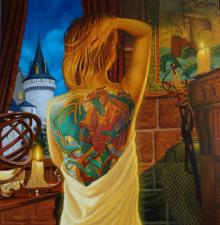 Golden Fool
Golden Fool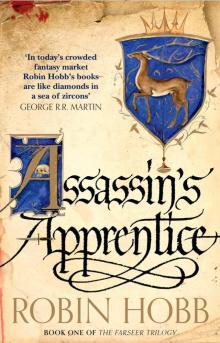 Assassins Apprentice
Assassins Apprentice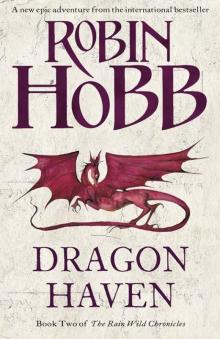 The Dragon Keeper
The Dragon Keeper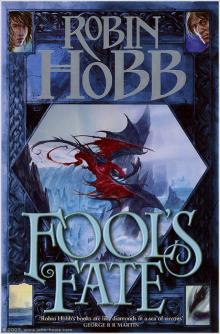 Fools Fate
Fools Fate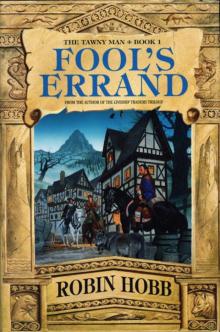 Fools Errand
Fools Errand Fools Assassin
Fools Assassin The Mad Ship
The Mad Ship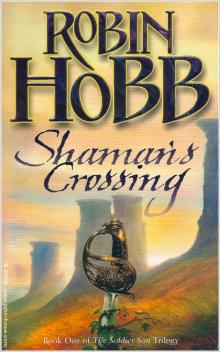 Shamans Crossing
Shamans Crossing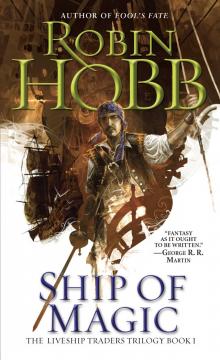 Ship of Magic
Ship of Magic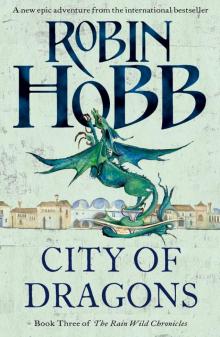 City of Dragons
City of Dragons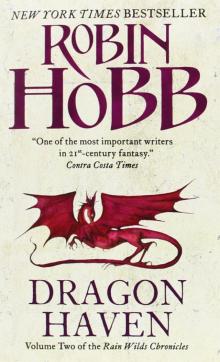 Dragon Haven
Dragon Haven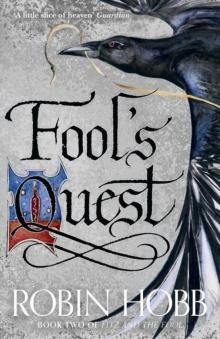 Fools Quest
Fools Quest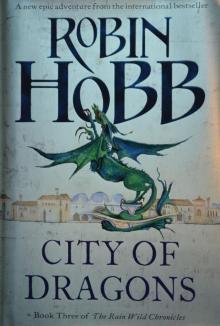 Blood of Dragons
Blood of Dragons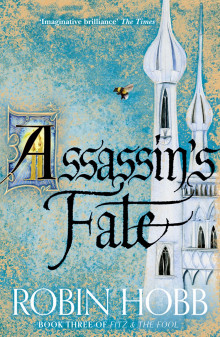 Assassin's Fate
Assassin's Fate Assassins Quest
Assassins Quest Renegades Magic
Renegades Magic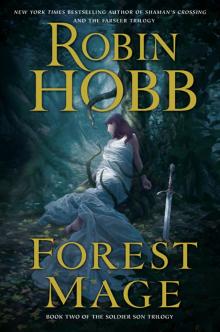 Forest Mage
Forest Mage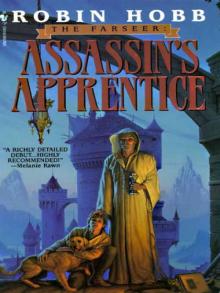 Assassin's Apprentice tft-1
Assassin's Apprentice tft-1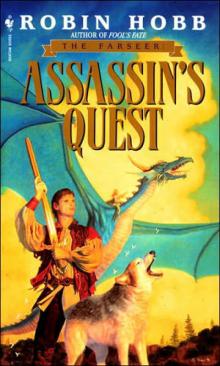 Assassin's Quest tft-3
Assassin's Quest tft-3 Royal Assassin
Royal Assassin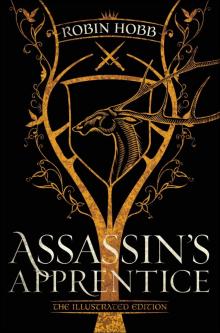 Assassin's Apprentice (The Illustrated Edition)
Assassin's Apprentice (The Illustrated Edition)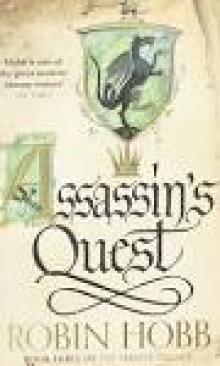 Assassin's Quest (UK)
Assassin's Quest (UK)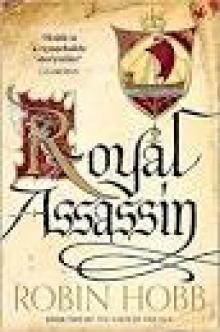 Royal Assassin (UK)
Royal Assassin (UK)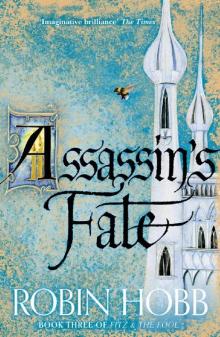 FF3 Assassin’s Fate
FF3 Assassin’s Fate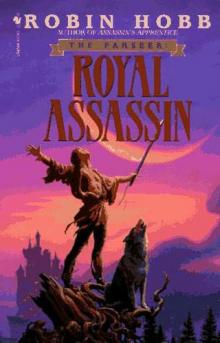 Royal Assassin tft-2
Royal Assassin tft-2 Fool’s Assassin: Book One of the Fitz and the Fool Trilogy
Fool’s Assassin: Book One of the Fitz and the Fool Trilogy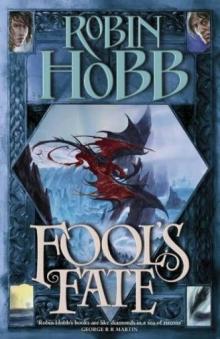 Fool's Fate ttm-3
Fool's Fate ttm-3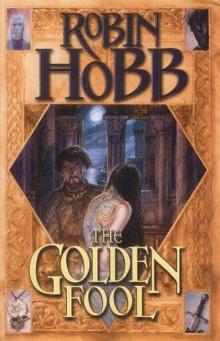 The Golden Fool ttm-2
The Golden Fool ttm-2 The Liveship Traders Series
The Liveship Traders Series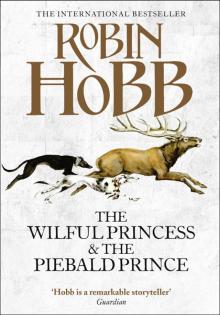 The Wilful Princess and the Piebald Prince
The Wilful Princess and the Piebald Prince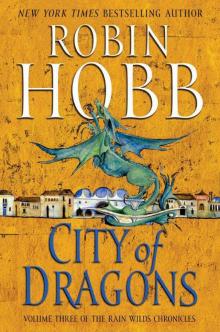 City of Dragons rwc-3
City of Dragons rwc-3 The Tawny Man 1 - Fool's Errand
The Tawny Man 1 - Fool's Errand Words Like Coins
Words Like Coins The Complete Tawny Man Trilogy Omnibus
The Complete Tawny Man Trilogy Omnibus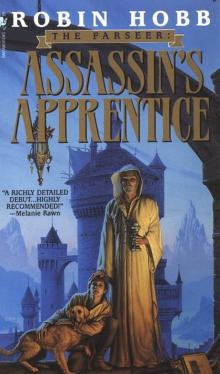 Farseer 1 - Assassin's Apprentice
Farseer 1 - Assassin's Apprentice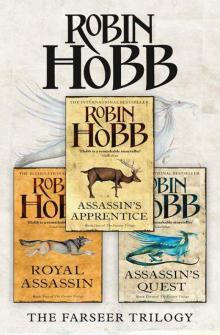 The Complete Farseer Trilogy Omnibus
The Complete Farseer Trilogy Omnibus The Soldier Son Trilogy Bundle
The Soldier Son Trilogy Bundle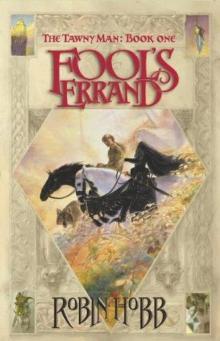 Fool's Errand ttm-1
Fool's Errand ttm-1 Blue Boots
Blue Boots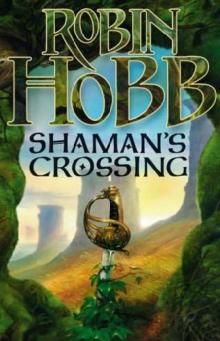 Shaman's Crossing ss-1
Shaman's Crossing ss-1 Mad Ship
Mad Ship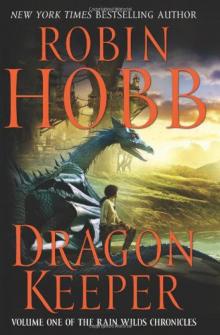 Dragon Keeper
Dragon Keeper The Willful Princess and the Piebald Prince
The Willful Princess and the Piebald Prince Ship of Destiny tlt-3
Ship of Destiny tlt-3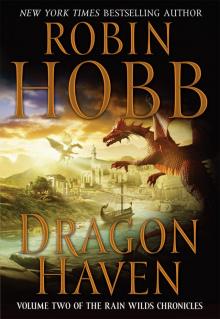 Rain Wild Chronicles 02 - Dragon Haven
Rain Wild Chronicles 02 - Dragon Haven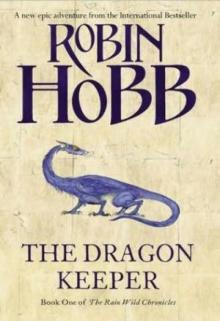 The Dragon Keeper trwc-1
The Dragon Keeper trwc-1 The Triumph
The Triumph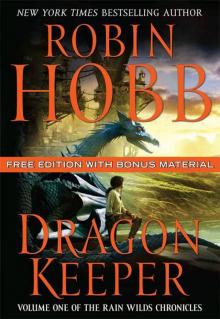 Dragon Keeper Free Edition with Bonus Material
Dragon Keeper Free Edition with Bonus Material Mad Ship tlt-2
Mad Ship tlt-2 The Inheritance and Other Stories
The Inheritance and Other Stories Tawny Man 02 - Golden Fool
Tawny Man 02 - Golden Fool Farseer 2 - Royal Assassin
Farseer 2 - Royal Assassin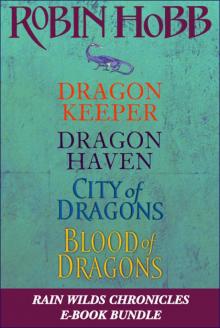 Rain Wilds Chronicles
Rain Wilds Chronicles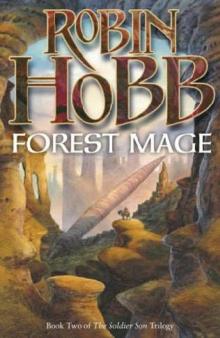 Forest Mage ss-2
Forest Mage ss-2 Ship of Magic lt-1
Ship of Magic lt-1 Renegade's Magic ss-3
Renegade's Magic ss-3